Peek into Gezer's biblical past to uncover how this ancient city's secrets reshape our understanding of Israel's storied history—discover what lies beneath.
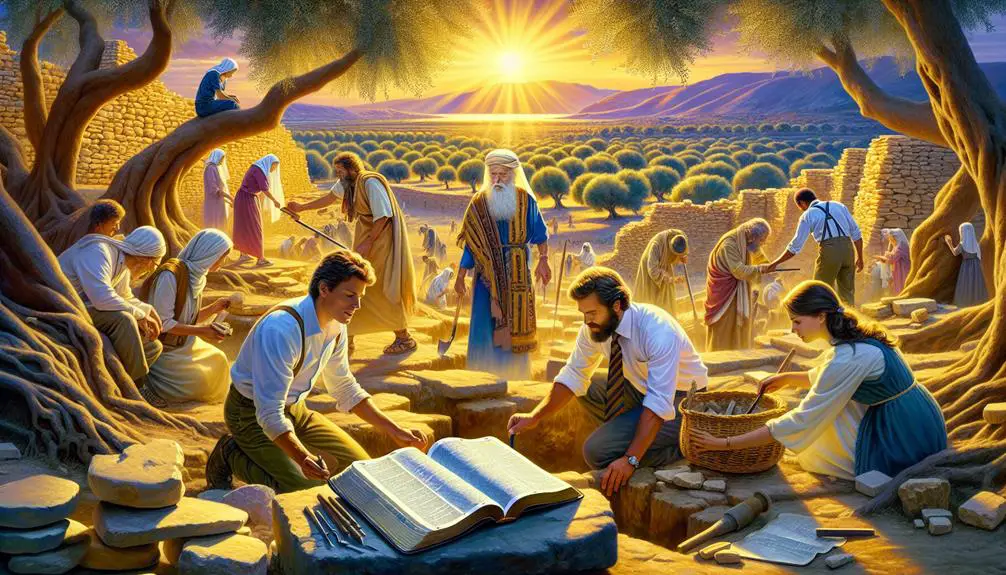
Gezer in the Bible
Like a beacon in the night, Gezer's biblical significance illuminates aspects of ancient Israel's history and culture that remain shrouded in mystery.
You'll find that Gezer's strategic location served as a crossroads for commerce, military campaigns, and cultural exchange, making its mark in the historical and prophetic narratives of the Bible.
From its conquest by a Pharaoh to its role in Solomon's marriage alliance, Gezer's story is intertwined with pivotal moments in Israel's past.
But what secrets lie beneath its ruins, and how do these revelations challenge our understanding of biblical history? The answers might surprise you, inviting a closer look at a site that continues to captivate scholars and believers alike.
Key Takeaways
- Gezer's strategic location and historical events are deeply intertwined with biblical narratives and prophecies.
- Solomon's acquisition of Gezer highlights its political and economic significance in biblical times.
- Archaeological discoveries at Gezer provide tangible connections to its biblical history and cultural practices.
- Gezer serves as a symbolic crossroads, reflecting the complex interplay of faith, culture, and politics in biblical history.
Gezer's Biblical Significance
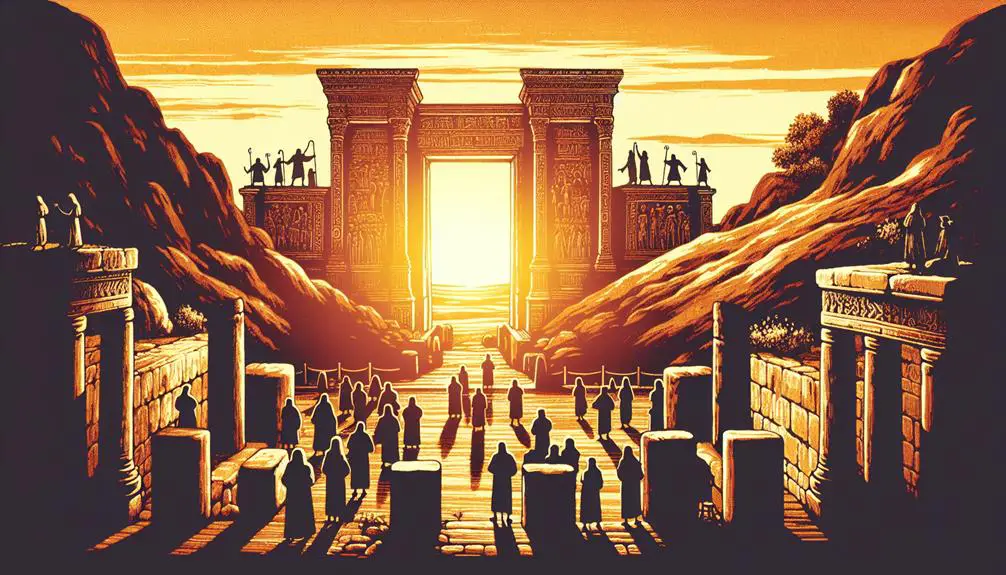
In the canvas of biblical history, Gezer stands as a strategic city whose significance is underscored by its recurrent mention and pivotal role in various narratives. You'll find its roots deeply entangled with Canaanite culture, casting a light on the religious practices that shaped the region.
As you delve into its biblical significance, it's crucial to understand how these elements not only define Gezer's historical essence but also its spiritual landscape.
Analyzing Gezer reveals the profound impact of Canaanite culture on the city's identity. The religious practices prevalent in Gezer, reflective of broader Canaanite traditions, provide a backdrop against which the biblical narratives unfold. You're looking at a city where the interplay between faith and culture showcases a rich tapestry of ancient life, deeply influencing the spiritual and social dynamics of its inhabitants.
This exploration isn't just about historical curiosity; it's an invitation to comprehend the complexities of faith and culture that defined Gezer. Through this lens, you gain insights into the challenges and influences faced by the people of Gezer, offering a methodical and faith-informed perspective on its biblical significance.
Historical Context of Gezer

To grasp the historical context of Gezer, you must explore its timeline, revealing a city at the crossroads of ancient civilizations and pivotal biblical events. This exploration not only enriches your understanding of its place in scripture but also deepens your appreciation for the intricate tapestry of history woven through the Bible.
Gezer thrived within the Bronze Age economy, a period marked by significant advancements in metallurgy, agriculture, and trade. Its prosperity wasn't merely a result of geographic luck but also of the industriousness and ingenuity of its inhabitants. They engaged in cultural exchanges that brought not only wealth but also diverse ideas and innovations to their city. This exchange was pivotal, as it allowed Gezer to become a melting pot of ancient cultures, contributing to its significance in biblical narratives.
The city's story is a testament to God's sovereignty over history, with its rise, fall, and the roles it played in the lives of His people. Delving into Gezer's past, you'll uncover layers of faith, struggle, and redemption, mirroring the broader themes of the Bible itself. This historical context sheds light on why Gezer holds a special place in the biblical narrative, offering insights that go beyond its archaeological footprint.
Gezer's Strategic Location
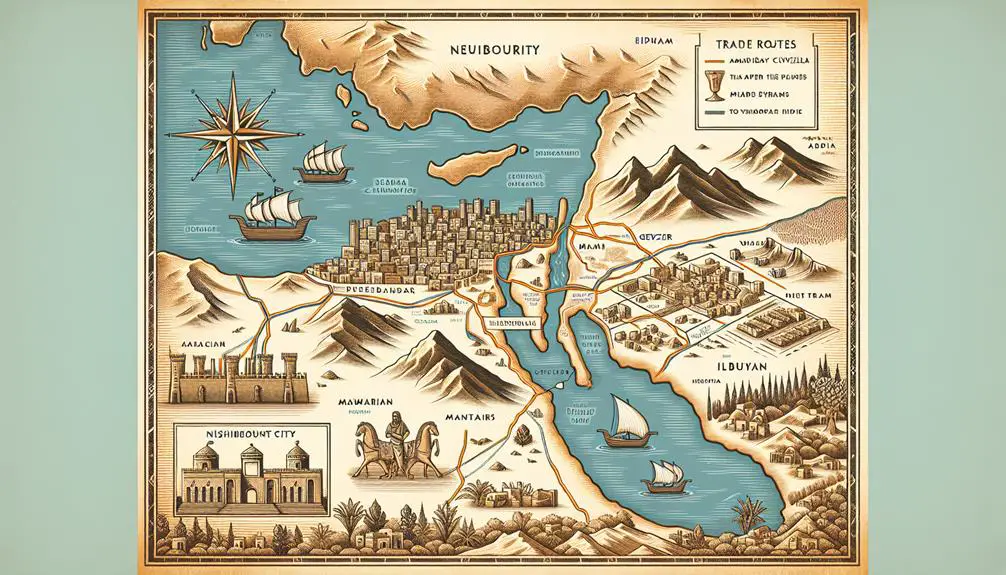
Gezer's strategic position at the crossroads of ancient trade routes bestowed upon it a pivotal role in the unfolding of biblical history. This location wasn't just a matter of chance. Divine providence placed Gezer in a spot that would ensure its involvement in the narratives that shaped the faith of many.
You see, by sitting at this junction, Gezer controlled access to crucial water sources and facilitated the movement of goods, ideas, and peoples between Egypt and the Mesopotamian and Anatolian regions.
The significance of trade routes and water sources can't be overstated in an ancient context. They were the lifeblood of cities, determining their economic strength, political influence, and military capabilities. Gezer's control over these assets made it a city of immense importance. It served as a gatekeeper, a role that would have profound implications for the surrounding nations and the stories recorded in the Bible.
Understanding Gezer's geographic and strategic position helps you appreciate its biblical mentions not just as historical footnotes but as acknowledgments of its central role in the region's dynamics. Its location was a key factor in its destiny, a testament to the intricate design behind biblical history.
Archaeological Discoveries at Gezer
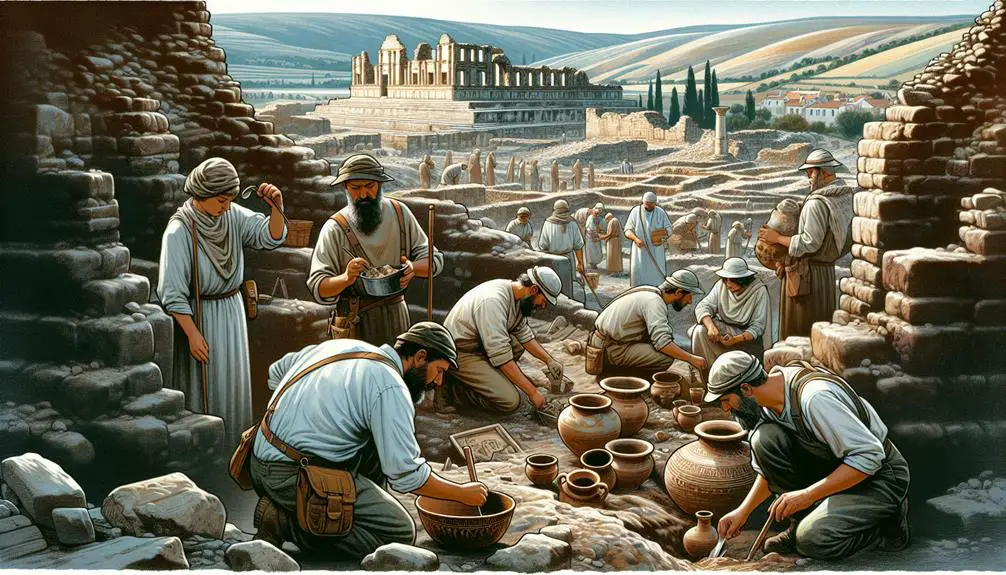
Reflecting on the strategic significance of Gezer, it becomes clear that archaeological findings have further illuminated its biblical prominence, offering tangible links to the narratives cherished by many believers. Through methodical excavation methods and meticulous artifact preservation, researchers have uncovered layers of history that resonate with biblical accounts, providing a deeper understanding of Gezer's role in ancient times.
Key discoveries at Gezer include:
- Inscriptions that reference historical figures and events paralleling biblical narratives.
- Ancient fortifications that depict Gezer's strategic importance in military history.
- Religious artifacts that offer insights into the spiritual life of its inhabitants, echoing biblical practices.
- Everyday items that paint a vivid picture of daily life in biblical times, bridging the gap between past and present.
These findings aren't just historical footnotes; they're testaments to the enduring legacy of Gezer in the tapestry of biblical history. Through careful excavation methods and a commitment to artifact preservation, archaeologists have provided a window into the past, affirming the significance of Gezer within the broader context of faith-informed scholarship. This analytical approach not only honors the biblical narrative but also enhances our understanding of the ancient world.
The Conquest by Pharaoh
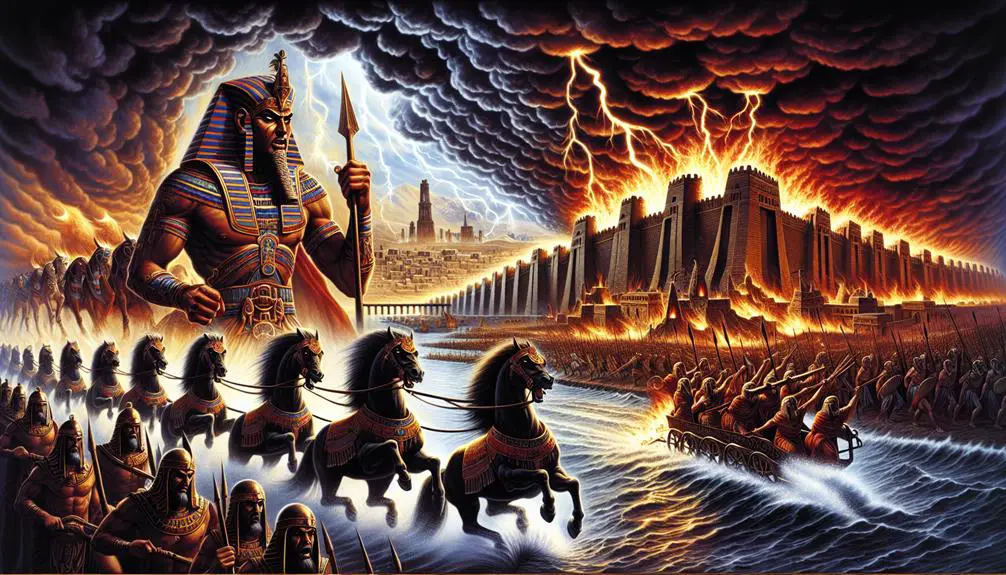
You'll find that the conquest of Gezer by the Pharaoh wasn't merely a display of military might, but a calculated strategy deeply intertwined with Gezer's strategic importance. This act not only showcased Pharaoh's understanding of military tactics but also his recognition of Gezer as a critical asset in controlling the region.
Analyzing this episode offers insights into the broader narrative of divine providence and human agency in biblical history.
Pharaoh's Military Strategy
In analyzing Pharaoh's military strategy during the conquest of Gezer, it's evident that his approach wasn't only tactical but also deeply intertwined with the geopolitical dynamics of the period. His strategy was meticulously planned, incorporating both naval tactics and diplomatic negotiations, showcasing a profound understanding of warfare and statecraft. This methodical approach underlines the wisdom in leveraging both military might and the art of diplomacy.
- Naval tactics: Employed to secure strategic waterways and ensure logistical support.
- Diplomatic negotiations: Used to forge alliances and undermine enemy morale.
- Geopolitical awareness: Demonstrated in the strategic selection of targets.
- Integration of forces: Combining various military units for a cohesive offense.
This strategic blend highlights a comprehensive approach, rooted in a faith-informed perspective on stewardship and leadership.
Gezer's Strategic Importance
To grasp the conquest of Gezer by Pharaoh fully, it's crucial to understand its strategic significance, which lay at the heart of ancient trade routes and military pathways. Gezer's location wasn't just prime real estate; it was a divine chessboard piece.
Situated at the crossroads of civilizations, it controlled access to vital trade routes that were the lifeblood of ancient commerce. Furthermore, its proximity to water sources made it a beacon for life in a landscape that could often be unforgiving. This combination of trade connectivity and essential resources made Gezer a gem worth possessing.
It's no wonder then that Pharaoh saw its capture not just as a military conquest, but as a divine mandate to secure a foothold in the land promised to God's people.
Solomon's Marriage Alliance
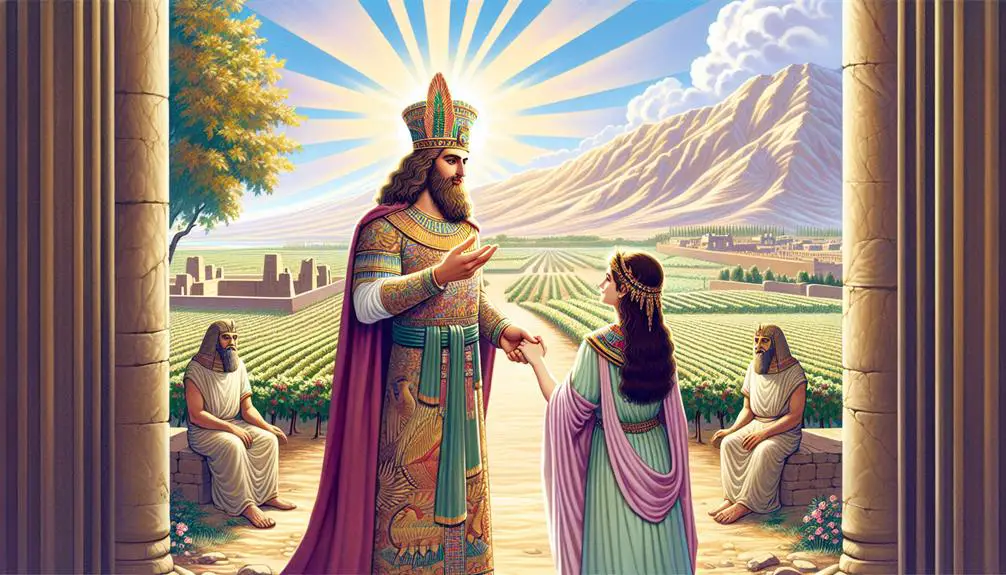
Solomon's marriage alliance, notably through his union with Pharaoh's daughter, significantly influenced the geopolitical landscape of his era, securing Gezer as a strategic asset. This alliance, a masterstroke in ancient diplomacy, wasn't just a union of two hearts but a calculated move to bolster Solomon's kingdom's security and prosperity.
The dowry negotiations that preceded this union were intricate, showcasing Solomon's wisdom and foresight. Gezer, given as part of the dowry, symbolized the tangible benefits of such alliances. However, this marriage also introduced cultural assimilation challenges, as the merging of Israelite and Egyptian customs and religious practices raised concerns among the faithful.
- Dowry negotiations: Highlighted Solomon's strategic acumen, securing Gezer, a pivotal city.
- Cultural assimilation: Fostered a blend of Israelite and Egyptian cultures, posing both opportunities and challenges for Solomon's reign.
- Strategic asset: Gezer's acquisition enhanced the kingdom's defense and trade routes.
- Faith-informed perspective: Raises contemplation on the balance between political alliances and maintaining religious purity.
Analyzing Solomon's marriage alliance reveals a complex interplay of politics, culture, and faith, emphasizing the king's role in navigating these realms to fortify his kingdom.
Division Among Israel's Tribes
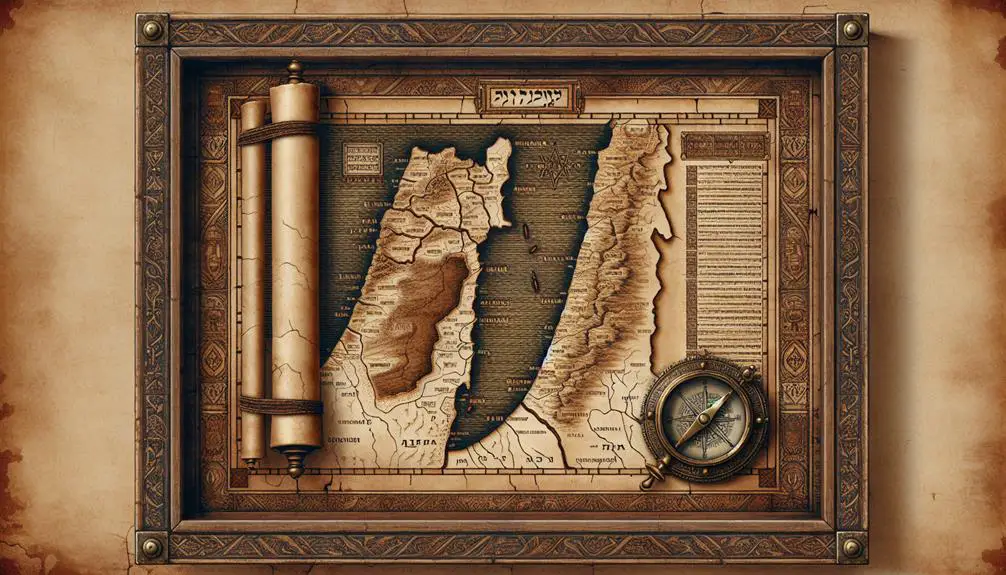
The division among Israel's tribes, following Solomon's reign, starkly reveals the complexities of maintaining a united kingdom amidst growing dissent and religious deviation. You'll find that the roots of this fragmentation weren't merely political but were deeply entrenched in spiritual deviations and the forsaking of covenantal obligations. Solomon's alliances and marriages, which were initially strategic, inadvertently seeded discord and idolatry among the people, leading to a fracturing of the united front that David had established.
As you delve deeper, you'll notice that the emergence of tribal alliances wasn't just a political maneuver but a reflection of a deeper longing for covenant renewal and a return to the faith of their ancestors. These alliances were both a symptom of the division and a desperate attempt to realign with the Divine mandates that guided their forebears. This period serves as a poignant reminder of the challenges in maintaining a spiritual and national identity in the face of external influences and internal strife.
Understanding this era requires recognizing the pivotal role that faith played in shaping the political landscape. The call for covenant renewal amidst division highlights the enduring belief in the possibility of restoration and unity through a collective return to spiritual foundations.
Gezer in Prophecy and Memory

As you explore Gezer's prophetic significance, you'll find its role in biblical narratives isn't just historical but deeply symbolic, pointing to broader themes of redemption and judgement.
Recalling Gezer's past allows us to see how memory and prophecy intertwine, shaping the faith and identity of Israel.
Gezer's enduring legacy, then, isn't merely about ancient stones but about how its story continues to inspire and challenge believers today.
Gezer's Prophetic Significance
Gezer's role in biblical prophecy highlights its significance as a city remembered for its spiritual and historical implications. Its mention in scripture isn't merely a historical footnote; rather, it serves as a beacon of divine orchestration and human interaction within a sacred narrative.
- Modern interpretations of Gezer's prophetic roles enrich our understanding of its spiritual legacy.
- Symbolic parallels between Gezer's historical events and biblical prophecies offer deep insights into God's plans.
- Gezer's strategic location symbolizes crossroads of faith and destiny, echoing its biblical portrayal.
- Its archaeological layers serve as tangible reminders of divine providence and human agency, intertwined through ages.
Analyzing Gezer through this faith-informed lens invites you to reflect on the city's enduring legacy in both history and prophecy.
Recalling Gezer's Past
Delving into Gezer's storied past, we uncover layers of prophecy and memory that reveal its pivotal role in biblical narratives. This ancient city, steeped in history, offers us a window into the spiritual and everyday life of its inhabitants. Through a closer examination, you'll find that Gezer's flora and civic structures not only supported its people but also played significant roles in fulfilling biblical prophecies.
Aspect |
Significance |
|---|---|
Gezer's Flora |
Symbolized prosperity and divine favor |
Civic Structures |
Represented order, leadership, and community faith |
Gezer's Enduring Legacy
Throughout history, numerous prophecies have intertwined with Gezer's fate, underscoring its significant legacy in both memory and biblical scripture. This city's story isn't just an ancient tale but a living testament to the enduring nature of faith, cultural rituals, and the powerful way they shape our understanding of the past and present.
- Cultural rituals: Gezer's practices offer insight into the spiritual life of ancient societies.
- Modern parallels: Contemporary ceremonies echo Gezer's ancient customs, highlighting humanity's ongoing search for meaning.
- Prophecies: The city's destiny, as foretold in scriptures, reinforces its spiritual significance.
- Memory: Gezer remains a symbol of faith's lasting impact on culture and history, bridging the gap between ancient texts and today's beliefs.
Frequently Asked Questions
What Archaeological Techniques Were Used to Date the Structures Found at Gezer, and How Accurate Are These Methods?
To date the structures at Gezer, archaeologists used radiocarbon dating and stratigraphy analysis. These methods are quite accurate; radiocarbon dating measures the decay of carbon isotopes, providing dates within a certain range.
Stratigraphy analysis examines the layers of earth to understand the sequence of human activity. Both techniques, when combined, offer a reliable timeline, aligning well with historical records.
They're pivotal in piecing together past civilizations, offering insights that are both methodical and faith-informed.
How Has the Discovery of Gezer Influenced Our Understanding of Daily Life in Ancient Israelite Society?
Discovering Gezer is like uncovering a time capsule, offering you a vivid glimpse into ancient routines. You'll see how agricultural techniques weren't just survival strategies but a testament to their connection with the land.
Their trade networks reveal a society deeply interconnected with distant cultures, enriching their daily lives. This analysis, grounded in faith, suggests their practices were more than mere survival; they were expressions of stewardship and community.
Are There Any Connections Between the Artifacts Found at Gezer and Narratives Found in Other Ancient Near Eastern Texts or Cultures?
You're exploring how artifacts from Gezer tie into broader ancient Near Eastern cultures. By examining cultural parallels and textual similarities, you'll find that many items reflect shared practices and beliefs across the region.
This approach not only deepens your understanding of Gezer but also highlights the interconnectedness of ancient societies. Through a faith-informed, analytical lens, you'll see how these connections illuminate the historical and spiritual landscape of the time.
How Do Modern Religious Communities View the Archaeological Findings at Gezer, and Do These Discoveries Affect Contemporary Religious Practices or Beliefs?
You're diving into how modern faith communities gaze at Gezer's dusty corners. It's not just an archaeological playground; it's a theological puzzle.
Through interfaith dialogue, these discoveries spark debates and sometimes even reshape religious practices or beliefs. Analyzing Gezer's theology, you're walking on a tightrope between historical curiosity and faith-informed reverence.
It's a methodical journey, understanding how ancient artifacts weave into the fabric of contemporary faith.
What Measures Are Being Taken to Preserve the Archaeological Site of Gezer for Future Generations, and How Can the Public Contribute to These Efforts?
To preserve the archaeological site of Gezer, authorities are ramping up security to prevent site vandalism and implementing tourist education programs.
You can help by respecting the site's guidelines, participating in awareness campaigns, and donating to preservation funds.
These efforts ensure that future generations can learn from and experience this historical treasure.
Your contribution, guided by a faith-informed perspective, adds valuable support to these preservation measures.
Conclusion
In the tapestry of Biblical history, Gezer stands as a vibrant thread, weaving through ancient narratives with strategic significance. Its stones whisper tales of power, faith, and divine orchestration. From the archaeological whispers of its past to the prophetic echoes in scripture, Gezer's story is a testament to the intricate dance between human ambition and divine plan.
As you reflect on Gezer's place in the Bible, consider how it illustrates the meticulous hand of God shaping history, inviting us to see our part in His grand design.

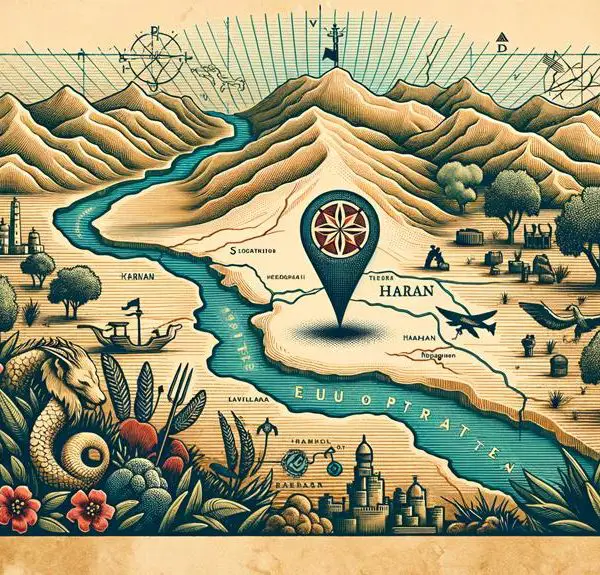

Sign up